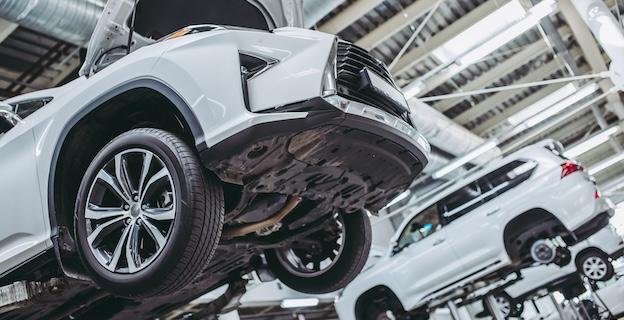5 Min Read • August 14, 2024
3 Misconceptions About Dealership Service Departments

Misconceptions about franchise car dealership Service departments persist despite industry efforts to change the conversation. You know how it goes: Dealership service centers are too expensive; the technician around the corner will do the same work; etc.
As a result, many vehicle owners skip car dealerships and turn to independent and chain shops. Franchise dealers retain only about 30% of customers after warranties and maintenance programs expire, according to CDK Research. That lost revenue adds up to tens of millions of dollars every year.
Yet, as vehicles become more advanced with more technology than ever before, and as EVs gain more market share, the expertise that the dealer’s Service department offers is key to keep vehicles running the way manufacturers intended.
Every interaction your team has with a customer or prospect is an opportunity to change the conversation about your Service department. Read on for talking points to help counter three of the biggest misconceptions.
Dealerships Service Centers Are More Expensive
We recognize the dealership may cost more for some services; however, here are some things to consider when speaking with consumers. Dealers have dozens of auto Technicians and specialized experts, in addition to the right parts and OEM components, to perform all types of work in a short amount of time. Quality work and an efficient experience are important to today’s drivers, and dealership Service centers shine on both points.
And while technicians can sometimes offer services at a lower cost, dealerships can provide comparable prices thanks to monthly auto service specials, oil change coupons, and more.
Dealers also have an advantage when it comes to repairs outside of a warranty period and recalls because they typically guarantee repairs with a warranty that’s good nationwide. If the part fails, it can be fixed under warranty and at any franchised dealership. Independent repair facilities most likely can’t offer this benefit.
Other advantages to reinforce with customers include the breadth and depth of services only a dealer can provide. Whether it’s a standard oil change, engine or transmission repairs, the dealer can handle it all while smaller independent shops have limits on what they can do. Loaner cars or rentals are another great service to reinforce. Even if it isn’t complimentary, dealers at least have an option to keep drivers on the road while their cars are being fixed.
Finally, we can’t ignore the growing number of EV drivers who’ll need services that independent shops just can’t handle. Dealers are the best source for EV-trained Technicians. And in our most recent Service Shopper 3.0 study, trained Technicians were some of the most desirable features dealerships provided. It’s a good strategy to emphasize the advanced technology in today’s cars and explain why a dealership’s Service Technicians are another reason to come to a dealership over the competition.
OEM Parts and Certified Technicians Don’t Matter
Genuine factory-trained Technicians and OEM parts do matter. Service shoppers ranked them second and third respectively as their top reasons for choosing a dealer over independents and chains in our most recent Service Shopper study. Here are some points to bring up with customers who question the value.
Dealer Technicians are manufacturer-trained and typically work only on the brands a dealership sells. The likelihood of quality service is much higher than with a Technician who works on a particular brand only once or twice a year. Plus, most dealers have ongoing training programs for their Techs, Service Managers, Advisers and support staff to keep up with the latest upgrades and repair techniques.
When it comes to parts, the best way to keep a car running at optimal performance is to repair with the same parts it had when it rolled off the assembly line. OEM parts offer greater assurance of quality because these are the same as the parts on new cars and offer the same level of performance.
And the majority of manufacturers offer warranties for OEM parts and labor if something fails. A 12-month/12,000-mile warranty on parts and labor for repairs and/or service isn’t uncommon at the dealer level. And only dealers receive Technical Service Bulletins so factory-trained Technicians know how to make the repairs according to the manufacturer’s instructions.
Aftermarket parts may carry warranties, but the customer is on the hook for labor costs if the part needs to be replaced or fixed.
When I Sell My Car, It Won’t Matter Where I Went for Service
This is a big misunderstanding among vehicle owners and it can cost them when they go to trade up at a dealership or sell to a private party. A comprehensive service history makes the vehicle more reliable and therefore more likely to command a higher price from a buyer.
The best way to prove a vehicle has received the maintenance it needs to run reliably is to service at a dealership. This is because OEMs and dealers keep digital records of all service history that can be easily accessed. Independents most likely don’t offer this type of assistance.
A service record is especially important to franchised dealers because it’ll determine how much reconditioning they have to do to a trade-in to get it front-line ready. The better maintained a vehicle, the lower the reconditioning costs, and the more a dealer will pay for the trade.
Service revenue is a dealer’s best bet for reliable and steady income. Turn every customer interaction into an opportunity for your dealership staff to change the conversation and drive more business into your Service lanes.
Share This

Don is a Product Marketer at CDK where he drives the marketing strategy for Fixed Operations. A 25-year CDK veteran, he is passionate about developing and delivering product-specific information to support OEM partnerships for our automotive retail customers.









